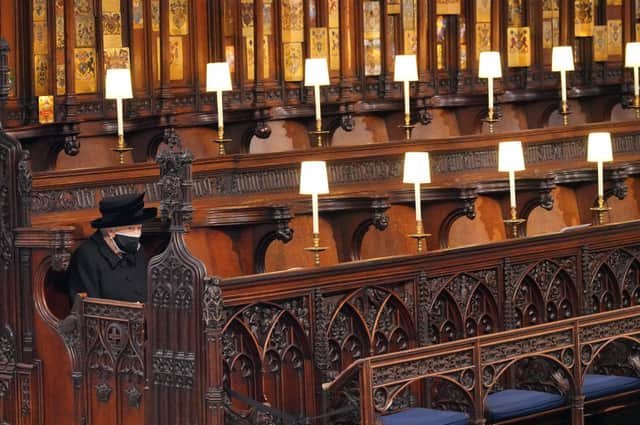Jimmy, Lena and the values they shared with the Queen - Euan McColm


Hers were values that, in some cases, are anachronistic, these days, yet they will be familiar to any of you who grew up with a working-class grandmother of a certain age.
As a child of the 1920s, Lena held views - on a range of subjects - that were of another time. “We never had gay people when I was a girl,” she once told me, “I mean, I suppose there was Johnny but I just thought he was a lovely dancer at the time.”
Advertisement
Hide AdAdvertisement
Hide AdBut those prejudices she held were as fragile as eggshells; they would shatter on contact with reality. Single mothers were a scourge until a single mother became a neighbour and then single mothers became heroes and anyone who dared suggest otherwise had better brace themselves for Lena could be fierce.
One belief she could never fully shake was that the warning about borrowing and lending was a good one. She disregarded the lender part of the adage, being endlessly generous, but the idea of being in debt frightened her.
It was for this reason that she and my grandfather, Jimmy - James, if he was answering the telephone in his pan breid voice - refused ever to buy a house. Even when he was in a very good job, they always rented.
And so when he retired 40 years ago, they moved from Lanarkshire to the top floor of a council tower block in North Drumry on the edge of Clydebank, the town in which they had raised my mother.
Their fellow residents were also pensioners. There was a community waiting for them. But in that community there were a lot of lonely people, elderly men and women, often widowed, too often somewhat neglected by their now-grown children, who were off in the world focusing on careers and their own children.
On the ground floor of their block, behind a padlocked door, was a series of empty rooms. This unused space, reckoned Jimmy and Lena, represented an opportunity to do something that would keep them busy and enhance their neighbourhood.
A steering committee was formed and, with the help of councillor Tony Worthington - who would go on to become their local MP - a small grant was obtained from the local authority. Jimmy, Lena, and their fellow volunteers then set about transforming those empty rooms into a club for pensioners.
Every morning, Jimmy - who had spent his working life overseeing engineering projects - would bake cakes in the tiny kitchen of their 12th floor flat. A couple of hours later, he’d be selling slices - for pennies - and serving cups of tea to men and women who now had a place to go. Lena would make soup - salty, barley-filled broth, flecked with lamb from the stock bone - and mince and tatties. For 30 pence, a visitor could eat enough to send them off to sleep through Jimmy’s afternoon bingo calling.
Advertisement
Hide AdAdvertisement
Hide AdSometimes there would be sing-songs. These were people who had lived - and, in many cases served - through the second world war. Memories of the Clydebank blitz were vivid, still. They would run through the old ones. And yes, it was sentimental but it was also - as I was to witness - deeply moving to hear a chorus of thinning voices sing “We’ll Meet Again”.
Jimmy and Lena were incredibly proud when, after their efforts were reported by a local councillor to officials at Buckingham Palace, they received an invitation to one of the Queen’s garden parties.
Of course, they were just two of thousands of people who would go to the event at the Palace of Holyroodhouse at the foot of Edinburgh’s Royal Mile, but such was their excitement that you might have thought they’d been asked to attend a private audience.
Service meant something to the Goodfellows and so, too, did Queen Elizabeth II. She was, for them, a living embodiment of the values they held dear.
She may not have been so for you. I’m sceptical, myself. But I wonder whether, when the Queen’s death was announced on Thursday, your thoughts drifted to those you have lost. I wonder whether, like me, you were surprised to find the news elicited such a profound emotional reaction.
Jimmy and Lena were to receive further garden party invitations and, for them, the thrill never diminished.
Back then, of course, I was very much opposed to the idea of monarchy. As a young man who had read clever books and had deep thoughts, I was appalled by the unfairness of the hereditary principle.
And yet I could not help but share in the pleasure these invitations brought.
Advertisement
Hide AdAdvertisement
Hide AdThey deserved that pleasure. Jimmy, Lena, and the others who volunteered at the club, were able to administer - for a few hours each day, at least - a cure for loneliness. That is a greater thing than most of us will ever accomplish.
Older now and just wise enough to recognise the limitations of my wisdom, I’m less exercised by the unfairness of monarchy. For many others it matters and my feelings are, I think, less important than the pleasure they take from Royal events.
I’m willing to wager that, in recent years, some of my fellow monarchy-sceptics were, despite their clever thoughts, moved by things the Queen did and said.
Her solitary attendance at her husband Philip’s funeral captured - in a single image - the losses suffered by so many during the Coronavirus pandemic.
Just 12 months previously, her words of reassurance in a televised address about the sacrifices required during lockdown - “better days will return: we will be with our friends again; we will be with our families again; we will meet again” - were beautifully judged.
Jimmy and Lena Goodfellow would have thought so, too.